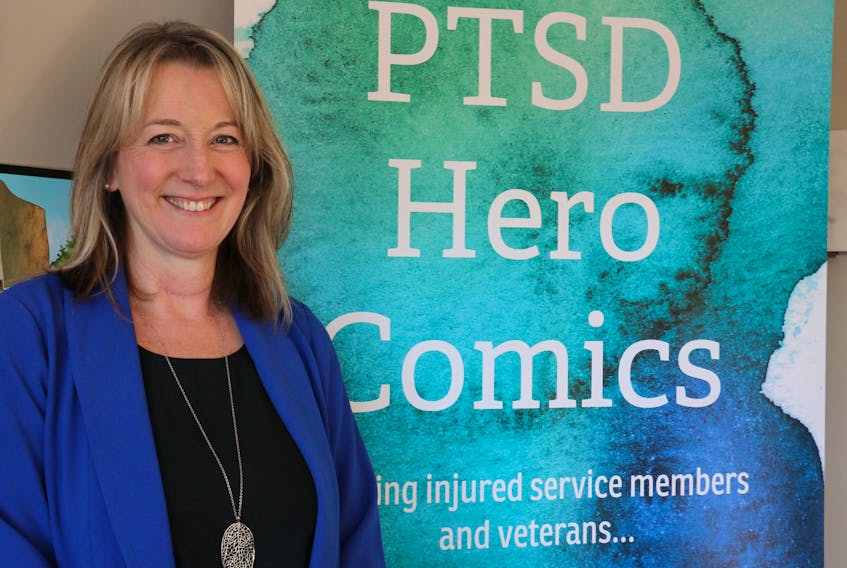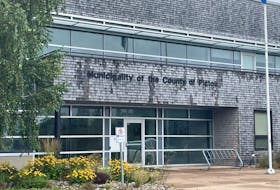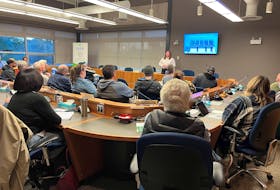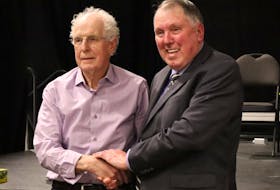FALMOUTH, NS - A Falmouth-based psychologist with a life-long interest in helping people who have suffered trauma has found a way to extend her reach.
Dr. Belinda Seagram, who opened Seagram and Associates about eight years ago in Falmouth, works primarily with veterans, first responders, and military members with post-traumatic stress disorder (PTSD). She has witnessed the positive impact treatment can have and wants to replicate it so more people can benefit.
“People do get better. I've seen a lot of people really reclaim their lives and reinvent themselves, and that's been incredibly gratifying, but it takes a lot of hard work. It's not quick work,” warns Seagram.
As there is already a significant need for more mental health services in the province, Seagram has developed new platforms to reach more people struggling with PTSD.
“Post-traumatic stress is really an injury which often results in alienation from community, a sense of not belonging, a sense of being an outsider. I believe that any kind of effective strategy needs to incorporate community healing as part of the recovery process,” said Seagram.
Landing Strong

There currently isn't a good set up in this province, she says.
“We have extremes here. People can get one-on-one hourly (help) or, if they're really not in good shape, sometimes they're shipped out of province to the tune of about $100,000 per person, but the care happens away from home and then they come back here and they're removed from that care facility. I believe quite strongly that we need to be providing that care here,” she said.
That's why Seagram is launching Landing Strong - an intensive day treatment program for people with PTSD. Renovations to the Cedar Centre in Windsor have already begun. The first session is anticipated to start in September 2018. Each program will run for three months, five days a week.
For those who finish the intensive three-month period but still require some assistance, they will be welcomed back weekly, on Fridays.
Seagram would like to eventually see services extended to the entire family, possibly through summer camps for children or couple/family weekends.
Seagram says the new program is an idea that she has been considering for a few years. Psychologists from across the province have already expressed an interest in taking part, and Seagram has started reaching out to possible funding partners in hopes of fully financing the pilot program for two years.
“Starting a program up like this is extremely expensive but we want to do it well, we want to do it right and I'm dedicated to making it happen, whether we get external funding or not, because it's just that important,” said Seagram, who has been a registered psychologist for 25 years.
Seagram said it is the community's responsibility to help those who, for so long, have helped others.
“These are people who put their lives on the line for us. Whether going overseas or staying at home, they've signed up to be of service and they're willing to put themselves at risk,” said Seagram.
“It is my core belief that as a community, it's our responsibility to care for them when they come home or when they leave that service. Whether they're military members, veterans or first responders, those are all people who dedicated themselves to service and I would love to see us, as a community in the Atlantic provinces, joining to really create this holistic, comprehensive way of supporting them.”
Read more stories in this series:
• Pension for Life for Veterans will help military personnel with PTSD: federal minister
'Bringing them back into the community'
Military veteran Doug Allen, who is a social worker at Seagram and Associates and is involved in the day treatment project, shares a similar view. He's equally excited to see the project take off and says the community should be as well. The people being treated — like paramedics, firefighters, military members, veterans and healthcare professionals — are already leaders in the community or people who hold great responsibility.
“The skill sets that they bring and the skill sets that they've developed and the leadership and everything that they've done in their training is still in existence. It's still there. What we're doing is we're bringing them back into the community, making them functional in the community and it's the community that's going to benefit once again,” said Allen.
Allen, who grew up in Annapolis Royal, joined Seagram's Falmouth practice in the fall of 2016. He served for 20 years in the infantry and transitioned out of the military to become a social worker. He primarily works with veterans, law enforcement officers, and firefighters.
Comic book launched
Seagram has another approach as well: a new comic book series.
PTSD Hero Comics is a comic book series designed to be an engaging therapeutic tool. Its purpose is to help educate people on what post-traumatic stress is, explain how the condition can manifest itself, and help decrease people's sense of isolation.
“The feedback that we're hearing so far is that when people are reading it, they're taking it home and they're actually showing their spouses and their kids and generating a lot of family discussion. They said it's a very helpful way for them to explain to their family members what's going on for them,” said Seagram.
Currently, the comic, which is still in the pilot stage, is available at Atlantic News in Halifax or online.
Lifelong passion
When Seagram was an undergraduate student, she thought about becoming a police officer. When she got into grad school, she did her master thesis on stress and attrition in policing — factors why people leave the force — then completed her doctorate work with violent young offenders.
She also worked at a shelter and saw first hand the result of trauma on women and children.
“I felt the need to get to the source so I worked in a federal penitentiary, where I was a chief psychologist for seven years,” said Seagram.
Such institutions are made up of traumatized people, she said.
“They're often products of the child welfare system and people who have been through horrific abuse, and instead of having the opportunity to heal and recover, they end up becoming alienated and angry and externalizing,” she said.
But some of the offenders she met were former police officers and military officers.
“They were people who had long, very successful careers an,d towards the end of their careers, had done quite extreme anti-social acts,” she said. “It wasn't a big leap to understand that their actions had been the consequences of too much exposure to trauma.”
When she relocated to Nova Scotia, she quickly discovered there was a great need for PTSD treatment.
“I had just finished the renovations and there was a knock on the door. I didn't have a sign — in fact, I still don't have a sign — and it was a veteran. He said 'I hear you're setting up shop and I'm here to sign up.' That was when I first understood the extent of the need here in Nova Scotia,” said Seagram.
“Through word of mouth, the practice very quickly blossomed.”
With other associates in place, Seagram has been able to specialize her area of practice to focus on the needs of veterans, first responders, and military members with post-traumatic stress.
“It's been a long-standing passion of mine. I've been working with trauma for the last 25 years. It seemed a natural progression.”
Diverse clientele
PTSD can affect people of all ages and genders, though some careers put people more at risk.
“How big is the problem? We had over 40,000 Canadian service personnel deployed to Afghanistan. That's the largest Canadian military operation since the Second World War. In the 12 years that we were in Afghanistan, we had 158 members killed and four civilians were killed and we had 1,800 military members wounded,” said Seagram.
During that same period, 178 Canadian Forces members died by suicide — more than the number killed overseas.
“These numbers, I would think, would be a significant underestimate because these are only for CF; it's not for veterans. Once they become veterans, it's harder to track outcomes.”
It's estimated that between one-quarter and one-third of Canadian service personnel who were deployed to Afghanistan will likely experience a mental health disorder - anything from anxiety to depression to PTSD.
“With the end of combat operations in Afghanistan, between 25,000 and 35,000 members have been released between 2011 and 2016. At least 2,700 of them can be expected to have severe PTSD; roughly 6,000 will suffer from a mental health problem diagnosed by a mental health professional,” she said.
Other statistics show that about 22 per cent of paramedics have been or will be diagnosed with PTSD, as well as about 16 per cent of firefighters and nine to 12 per cent of police officers. Seagram feels the incident rates for firefighters and police officers are likely higher than that, as many people tend not to report PTSD.
Allen points out that Nova Scotia has an incredibly high population of volunteer firefighters. He doesn't think the general population realizes how much trauma these volunteers come into contact with.
“They're actually exposed quite often to things that others would not want to be exposed to. But they do it quite regularly,” said Allen.
The earlier the better
Seeking help early, when symptoms are first starting to present themselves, helps people get back on their feet quickly, Seagram said.
“What makes me really happy is when people come in earlier in their careers — before they develop PTSD — because then there's the opportunity to do resilience work,” said Seagram.
“We can do work to clear some of the emotional loading of trauma so that they're less likely to develop post-traumatic stress. I would love to see a lot more of that going on. I would love to see more resiliency building programs happening through our centre as well, so we're not waiting until people are retiring, or close to retirement, with really quite severe injuries after so many years of exposure to trauma.”
Seagram said people who seek treatment learn valuable coping tools and are stronger because of it.
“The goal is never to return someone to their former self because that self got injured,” said Seagram. “We want to help them create an identity for themselves that really reclaims the parts of themselves they lost that they want back, but (also) to create an identity that's stronger and more resilient so that they'll be resistant to future injury. We want to give them the tools to protect them from future harm.”
Both Allen and Seagram are members of the Veterans Transition Network, a Canada-wide network that provides intensive retreats for veterans. There are about four, 10-day programs held each year in Atlantic Canada. The groups are small, with about six people at a time.
“I think part of it is the work with the VTN that really motivated me to want to get things going here in Windsor because I was seeing such huge results with people,” said Seagram.









